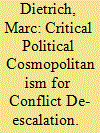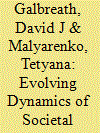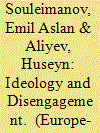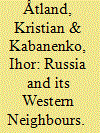|
|
|
Sort Order |
|
|
|
Items / Page
|
|
|
|
|
|
|
| Srl | Item |
| 1 |
ID:
174106


|
|
|
|
|
| Summary/Abstract |
How did ethnic Azeris in the Marneuli, Bolnisi and Dmanisi districts, located inside Georgia but bordering Azerbaijan, react to the reorganisation of political space along national lines after the Soviet Union’s dissolution? ‘Beached’ in foreign states bent on nationalising their domains, minorities throughout Eurasia sometimes rejected and sometimes accepted their alien rulers. This essay examines reactions to this predicament among Georgia’s Azeris. Drawing on elite interviews and data from a matched-guise experiment, it concludes that locals have come to accept their host state after its state-building nationalism took an inclusive turn and the distinction between aliens and natives faded.
|
|
|
|
|
|
|
|
|
|
|
|
|
|
|
|
| 2 |
ID:
174102


|
|
|
|
|
| Summary/Abstract |
Peace remains a highly contested analytical and political concept. Yet scholarly engagement with the empirical diversity of how states understand peace is strikingly rare. Following the constructivist view of peace as a subjective ontology, we investigate the peace conceptualisations of Russia and the United States as reflected in the contentious discourses at the United Nations Security Council. We seek to reveal whether the political debates reflect the plurality of analytical approaches to peace and study the conflict potentials that arise from clashes between conceptual subject positions. We find substantive divergence in the states’ basic understandings of peace and argue that the investigation of their respective conceptions opens an additional and much-needed perspective on the political discord between the two veto powers.
|
|
|
|
|
|
|
|
|
|
|
|
|
|
|
|
| 3 |
ID:
174105


|
|
|
|
|
| Summary/Abstract |
The conflict-prone peninsula of Crimea is again—since its annexation—the theatre of new conflict scenarios. When it comes to understanding the de-escalation and increasing potential of complex hybrid conflicts, theories in international relations are too often trapped in their state-centred perspective. Meanwhile, the role of the individual actor, alone or organised, often remains underestimated as political and moral agent. In this essay, I shed light on a critical yet politically practicable individual-centring notion of cosmopolitanism, which is framed by a set of universal principles and provides alternative insights to conflict de-escalation scenarios in Crimea beyond limiting state-centric paradigms.
|
|
|
|
|
|
|
|
|
|
|
|
|
|
|
|
| 4 |
ID:
174104


|
|
|
|
|
| Summary/Abstract |
In this essay we argue that changes in political structures in post-Soviet Ukraine have affected the potential for conflict during transition. Relying on organisational theory to determine the potential for conflict in Ukraine, we argue that this potential is structurally determined by the changing character of societal relations within and beyond Ukraine. The potential for conflict was always present in post-Soviet Ukraine, but this essay examines the facts of when, how and why conflict happened, and how it was related to weak state institutions, centre–periphery relations and an unsettled relationship with Russia. Relying on our analytical framework, we conclude that the conditions for further conflict greatly outweigh the conditions for peace.
|
|
|
|
|
|
|
|
|
|
|
|
|
|
|
|
| 5 |
ID:
174108


|
|
|
|
|
| Summary/Abstract |
Disengagement from militant groups has often been explained in individual terms such as battle fatigue or the desire to rejoin family and friends. We seek to examine empirically which other factors, beyond individual-level determinants, have influenced disengagement processes among militants belonging to different types of Chechen militant organisations. Drawing empirical insights from unique in-depth interviews with former members of the Chechen insurgency, their relatives, eyewitnesses to the Chechen wars and experts with first-hand knowledge of the researched phenomena, this study examines disengagement among jihadist and nationalist Chechen militants. Focusing on group-level factors, such as the capacity to resist external pressures, the use of violence, in-group social bonds and group cohesion, this article demonstrates that disengagement has been a less viable course of action for Chechen jihadists than for nationalist militants.
|
|
|
|
|
|
|
|
|
|
|
|
|
|
|
|
| 6 |
ID:
174103


|
|
|
|
|
| Summary/Abstract |
Since the Soviet Union’s collapse, Ukraine, Georgia and Russia have faced the challenge of taking their positions in the politics of international law as part of their transformation processes. Strong dynamics of conflict have shaped these states’ politico-legal actions and interactions, for example, the Russo–Georgian War, the annexation of Crimea and the armed conflict in East Ukraine. This essay explores whether, how and why Georgia, Ukraine and Russia ‘speak’ international law in international politics differently. It discusses conceptual approaches to empirically analysing the processes of translating political preferences into legal arguments as well as how ‘communicators of international law’ in the post-Soviet region use the language of international law differently.
|
|
|
|
|
|
|
|
|
|
|
|
|
|
|
|
| 7 |
ID:
174101


|
|
|
| 8 |
ID:
174107


|
|
|
|
|
| Summary/Abstract |
Since Russia’s military intervention in Ukraine in 2014, the security situation of Europe’s eastern ‘frontline states’ has undergone significant changes. In and around the Black Sea, the Baltic Sea and the Barents Sea, the scope and scale of military activity has grown, as has the frequency of Russian–Western military encounters. Despite the many similarities between the three regions, and despite the increased risk of negative spillover from one region to another, there are also noteworthy regional differences. As of today, the security challenges appear to be more severe and pressing in the southern and central part of the ‘frontline’ than in the northern.
|
|
|
|
|
|
|
|
|
|
|
|
|
|
|
|
|
|
|
|
|